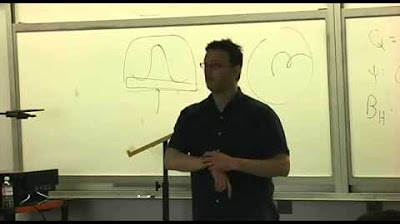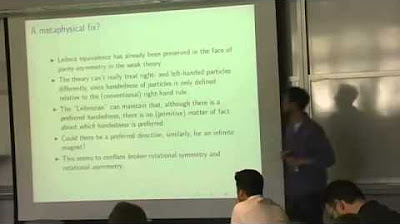Robert Spekkens: Leibniz’s principle of the identity of indiscernible as...
TLDRThe speaker explores the philosophical underpinnings of quantum theory, focusing on Leibniz's principle of the identity of indiscernibles and its implications for causality and realism in quantum mechanics. They delve into how this principle guides research in quantum theory interpretation, touching on Einstein's work and addressing concerns about instrumentalism. The talk suggests innovative approaches to Bayesian inference and causal models to reconcile quantum predictions with Leibniz's principle, hinting at a new ontology grounded in causal structures rather than traditional kinematics and dynamics.
Takeaways
- 📚 The speaker emphasizes the importance of the Leibniz principle in their research, particularly in the interpretation of quantum theory.
- 🌟 The Leibniz principle is introduced as a methodological guide that suggests if two things are indiscernible, they should be considered the same thing under different names.
- 🔍 The talk delves into the application of the Leibniz principle in physics, especially in Einstein's work, such as the theory of special relativity and the strong equivalence principle.
- 🤔 The speaker discusses concerns that adhering to the Leibniz principle might lead to instrumentalism or deny realism, but argues that it supports a form of realism based on observational principles.
- 💊 The Simpson's paradox is used as an analogy to critique the instrumentalist approach in quantum theory, highlighting the need for causal explanations in understanding phenomena.
- 🔬 The speaker introduces the concept of causal models and the challenges of inferring causality from operational data, advocating for a causal explanation in quantum mechanics.
- 🚫 The Leibniz principle is used to argue against certain causal explanations in quantum theory, such as superluminal causal influences or hidden common causes, which lack observational evidence.
- 🔗 The talk discusses the connection between the Leibniz principle and non-contextuality, suggesting that the former can provide constraints on the latter and help identify deviations from classical theories in quantum mechanics.
- 🔄 The speaker proposes a generalized approach to causal models in quantum theory that retains the Leibniz principle by generalizing the Bayesian inference framework and allowing for quantum states as nodes in causal structures.
- 🔮 The potential of the Leibniz principle to guide the interpretation of quantum theory is highlighted, suggesting it can offer a way to reconcile quantum predictions with the need for causal explanations.
- 📉 The speaker acknowledges ongoing research and challenges in developing a quantum Bayesian inference framework that fully aligns with the Leibniz principle and can handle complex inference scenarios.
Q & A
What is the central theme of the talk based on the provided transcript?
-The central theme of the talk is the exploration of the Leibniz principle in the context of quantum theory, particularly how it can be applied to interpret quantum phenomena and the challenges it poses.
What does the Leibniz principle state in the context of indiscernibles?
-The Leibniz principle states that 'to suppose two things indiscernible is to suppose the same thing under two names,' implying that if two things are observationally indistinguishable, they should be considered the same thing.
How does the speaker relate the Leibniz principle to Einstein's work?
-The speaker relates the Leibniz principle to Einstein's work by highlighting its influence on the development of the theory of relativity, specifically in the context of the special relativity paper and the strong equivalence principle.
What is the methodological principle inspired by the Leibniz slogan that the speaker adheres to?
-The methodological principle the speaker adheres to is that if a physical model posits two scenarios that are empirically indistinguishable but represented as ontologically distinct, then the model should be rejected or replaced with one that makes these scenarios ontologically the same.
What is the concern about taking the Leibniz principle too seriously in physics?
-The concern is that taking the Leibniz principle too seriously might lead to instrumentalism and a denial of realism, as it could be interpreted as a wholesale rejection of talking about unobservable entities.
How does the speaker address the worry of instrumentalism in relation to the Leibniz principle?
-The speaker addresses the worry of instrumentalism by arguing that commitment to the Leibniz principle leads to a form of realism that is educated by observational principles, rather than a wholesale rejection of unobservable entities.
What is the speaker's stance on the instrumentalist approach to quantum theory?
-The speaker rejects the instrumentalist approach to quantum theory because it fails to provide causal explanations, which the speaker believes are critical for understanding quantum phenomena.
What is the role of causal explanations in the speaker's interpretation of quantum theory?
-Causal explanations are essential in the speaker's interpretation of quantum theory because they help to clarify the underlying mechanisms and influences, distinguishing between inference and influence, which is necessary for a complete understanding of quantum phenomena.
How does the speaker use the concept of 'causal models' to interpret quantum theory?
-The speaker uses the concept of 'causal models' to interpret quantum theory by inferring the causal mechanisms from operational data, using a formalism that includes directed acyclic graphs and conditional probabilities to represent causal structures and their parameters.
What is the generalized notion of noncontextuality proposed by the speaker?
-The generalized notion of noncontextuality proposed by the speaker is an operational version that does not require deterministic probabilities, allowing for the derivation of noncontextuality inequalities that can be violated by quantum mechanics.
How does the speaker suggest preserving the spirit of locality and noncontextuality in quantum theory?
-The speaker suggests preserving the spirit of locality and noncontextuality in quantum theory by generalizing the formalism of causal models while maintaining a conservative approach to causal structure, and innovating the theory of Bayesian inference and causal dependence.
Outlines
📚 Introduction to Leibniz's Principle and Quantum Theory
The speaker begins by expressing gratitude to the organizers for the opportunity to delve deeper into philosophical principles underlying their research on quantum theory interpretation. They introduce the concept of 'liveness' as a methodological principle central to their work, which posits that indiscernible entities should not be considered distinct. The talk aims to explore the relevance of Leibniz's principle in physics and its potential impact on quantum theory, using historical correspondence between Leibniz and Clarke to illustrate the principle's significance and its application in modern physics.
🌟 Einstein's Silent Commitment to Leibniz's Principle
The speaker argues that Einstein's work, although not explicitly acknowledging Leibniz's principle, demonstrates a deep commitment to its ideals. Through examples from Einstein's papers on special relativity and the equivalence principle, the speaker shows how Einstein's theories align with the principle of ontological identity, rejecting models that suggest distinct scenarios with no observable differences. They also reference a philosopher of science who identifies similar methodological principles in Einstein's work, further supporting the connection.
🚧 Addressing Concerns of Instrumentalism and Realism
The speaker addresses potential concerns that adherence to Leibniz's principle might lead to instrumentalism or a denial of realism. They clarify that the principle guides the inclusion of elements in reality based on observable criteria, rather than rejecting unobservable entities outright. The speaker also rejects an instrumentalist approach to quantum theory, using Simpson's paradox to illustrate the importance of distinguishing between correlation and causation, advocating for a realist position that seeks causal explanations.
🔬 Causal Explanations and Quantum Phenomena
The speaker emphasizes the importance of causal explanations in understanding quantum phenomena and discusses the challenge of inferring causal models from operational data. They introduce the formalism of circuit diagrams and directed acyclic graphs to represent causal structures and highlight the difficulty of discerning true causality from observational data alone. The speaker also presents the 'reckon box principle,' which insists all correlations must be explained causally.
🔄 Leibniz's Principle and Quantum Causality
The speaker explores how Leibniz's principle can be applied to address causality in quantum mechanics, particularly in the context of the Bell experiment. They argue that the principle challenges explanations involving superluminal causal influences and superdeterministic models, as these would imply ontological facts without observable consequences. The speaker suggests that Leibniz's principle can guide the development of causal models that are consistent with quantum theory's nonlocality.
🔗 Non-Contextuality and the Quantum Violation of Classical Expectations
The speaker discusses the concept of non-contextuality, relating it to Leibniz's principle, and uses it to explore how quantum theory deviates from classical theories. They describe experimental setups that test for non-contextual correlations and explain how quantum theory can violate the resulting inequalities, suggesting that Leibniz's principle can reveal deeper differences between classical and quantum realms.
🛠️ Generalizing Causal Models for Quantum Theory
The speaker proposes a research program to generalize causal models to accommodate quantum theory while preserving Leibniz's principle. They suggest that the causal structure implied by quantum experiments is correct but that the parameters describing unobserved nodes should be reformulated using density operators on Hilbert spaces. This approach allows for the violation of classical inequalities while maintaining the spirit of locality and non-contextuality.
🏗️ The Challenge of Quantum Bayesian Inference
The speaker acknowledges that the quantum generalization of Bayesian inference is not straightforward and requires a formalism that can handle pre and post-selection scenarios. They discuss the need for a quantum Markov condition that can justify the use of quantum conditionals within the causal framework and mention ongoing work with colleagues to develop such a condition.
🔮 Ontological Implications and the Future of Quantum Causality
In the concluding remarks, the speaker reflects on the ontological implications of their research program, suggesting that the focus should be on causal structure as the basis for ontology. They propose that the union of kinematics and dynamics in quantum theory might be better understood through a causal lens and hint at the possibility of a web of unitaries and causal structures serving as an ontology.
Mindmap
Keywords
💡Leibniz's Principle
💡Empirical Indiscernibles
💡Quantum Theory
💡Special Relativity
💡Causal Structure
💡Bell's Theorem
💡Non-Contextuality
💡Bayesian Inference
💡Simpson's Paradox
💡General Covariance
Highlights
The speaker discusses the philosophical principles underlying their research into the interpretation of quantum theory, specifically focusing on the Leibniz principle and its implications for physics.
The Leibniz principle is introduced as a methodological principle guiding the speaker's research priorities in quantum theory interpretation.
An in-depth exploration of the Leibniz principle's statement that indiscernible things should not be supposed to be different under different names.
The speaker connects the Leibniz principle to Einstein's work, suggesting that Einstein was deeply committed to this principle in his theories.
Examples are given to illustrate how Einstein's special relativity and general relativity are consistent with the Leibniz principle.
The speaker addresses potential concerns about the Leibniz principle leading to instrumentalism or denying realism, arguing against these misconceptions.
Simpson's paradox is used to argue against the instrumentalist approach to quantum theory, emphasizing the importance of causal explanations in science.
The speaker proposes a new approach to quantum theory that maintains the Leibniz principle while allowing for violations of Bell inequalities.
A novel formalism for quantum Bayesian inference is introduced, which generalizes the standard Bayesian inference to accommodate quantum mechanics.
The concept of 'quantum variables' is presented as part of the new formalism, which are unobserved nodes in the causal graph associated with density operators.
The notion of 'conditional states' is introduced as an analogue of conditional probability in the quantum domain.
The speaker outlines a research program to further develop the quantum Bayesian inference formalism and its connection to causal models.
The potential of the Leibniz principle to guide the interpretation of quantum theory and provide a framework for causal explanations is emphasized.
The speaker suggests that the quantum formalism may be more about epistemology than ontology, challenging traditional distinctions between kinematics and dynamics.
The talk concludes with the idea that focusing on causal structure as the basis for ontology could lead to a new understanding of quantum theory.
The speaker leaves open questions about the ontology of quantum states and the nature of knowledge they represent.
A call for further research to explore the quantum Markov condition and its implications for causal models in quantum mechanics.
Transcripts
Browse More Related Video

Gordon Belot: The Wave Function for Primitive Ontologists

David Baker: Broken Symmetry and Spacetime

Rüdiger Schack: Participatory realism

Richard Healey: Correlations, probabilities and quantum states

What If Physics IS NOT Describing Reality?

Laura Felline: Scientific explanation in information-theoretic reconstructions of quantum theory
5.0 / 5 (0 votes)
Thanks for rating: